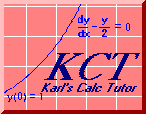

The problem was to use logarithmic differentiation to find the derivative of
(x + a)(x - b)
f(x) =
(x + c)(x - d)
where a, b, c, and d are all
constants.
The hint was that this is the product of four functions.
They are:
g1(x) = x + a
g2(x) = x - b
1
g3(x) =
x + c
1
g4(x) =
x - d
Step 1: Take the natural log of both sides.
æ(x + a)(x - b)ö
ln(f(x)) = lnç ÷
è(x + c)(x - c)ø
Step 2: Apply the log identity.
That is that the log of the product is the sum of the logs. And in this case you can also
use the identity about taking the log of a reciprocal. Remember --
ln(f(x)) = ln(x + a) + ln(x - b) - ln(x + c) - ln(x - d)
Step 3: Use the chain rule to take the derivative of both sides.
f'(x) 1 1 1 1=+--f(x) x + a x - b x + c x - d
Step 4: Multiply through by f(x).
æ 1 1 1 1 ö
f'(x) = ç + - - ÷ f(x)
èx + a x - b x + c x - dø
Step 5: Substitute the original product for f(x).
æ 1 1 1 1 ö (x + a)(x - b)
f'(x) = ç + - - ÷
èx + a x - b x + c x - dø (x + c)(x - d)
Step 6 (optional): Multiply it out.
(x - b) (x + a)
f'(x) = + -
(x + c)(x - d) (x + c)(x - d)
(x + a)(x - b) (x + a)(x - b)
-
(x + c)2(x - d) (x + c)(x - d)2
email me at hahn@netsrq.com